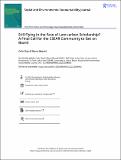Files in this item
Still flying in the face of low-carbon scholarship? A final call for the CSEAR community to get on board
Item metadata
| dc.contributor.author | Dey, Colin | |
| dc.contributor.author | Russell, Shona | |
| dc.date.accessioned | 2022-07-27T15:30:02Z | |
| dc.date.available | 2022-07-27T15:30:02Z | |
| dc.date.issued | 2022-12-01 | |
| dc.identifier | 280605512 | |
| dc.identifier | 694079e4-a3f5-4191-a8bf-a29e4bddbd84 | |
| dc.identifier | 85133532130 | |
| dc.identifier.citation | Dey , C & Russell , S 2022 , ' Still flying in the face of low-carbon scholarship? A final call for the CSEAR community to get on board ' , Social and Environmental Accountability Journal , vol. 42 , no. 3 , pp. 208-222 . https://doi.org/10.1080/0969160X.2022.2094983 | en |
| dc.identifier.issn | 0969-160X | |
| dc.identifier.other | RIS: urn:44650CD5C282D77F000B12ABF97BC9FF | |
| dc.identifier.other | ORCID: /0000-0002-3473-5019/work/116598027 | |
| dc.identifier.uri | https://hdl.handle.net/10023/25729 | |
| dc.description.abstract | Socio-ecological crises in the Anthropocene are shaking the assumptions, norms and practices of many disciplines. The climate emergency and the COVID-19 pandemic have substantially disrupted academic work and life with calls to return to normal, embrace change and many other options in between. Here, we invite critical discussion and reflection amongst the Centre for Social & Environmental Accounting Research (CSEAR) community on our collective reliance on international in-person conferences and associated air travel. In doing so, we seek to highlight the ways in which our intellectual and practical endeavours are increasingly being shaped by both the climate crisis and debates around post-pandemic academia. We also report on the results of a (pre-pandemic) survey of the CSEAR community, which reveals highly differentiated patterns of air travel, echoing global patterns of dependency and inequality. Following this, we outline various practical solutions that have been proposed or introduced at individual, institutional and community levels. These include recent grassroots campaigns which have sought to mobilise opinion around the issues and explore different practices and modes of organising knowledge production, as well as the work of other academic communities attempting to enact commitments to lower their carbon emissions. Finally, we briefly outline the wider contours around low carbon scholarship and conclude by considering whether this is sufficient to contribute to collective efforts for scholarship for sustainability. | |
| dc.format.extent | 15 | |
| dc.format.extent | 1488981 | |
| dc.language.iso | eng | |
| dc.relation.ispartof | Social and Environmental Accountability Journal | en |
| dc.subject | H Social Sciences (General) | en |
| dc.subject | E-NDAS | en |
| dc.subject | SDG 10 - Reduced Inequalities | en |
| dc.subject | SDG 13 - Climate Action | en |
| dc.subject | AC | en |
| dc.subject | MCC | en |
| dc.subject.lcc | H1 | en |
| dc.title | Still flying in the face of low-carbon scholarship? A final call for the CSEAR community to get on board | en |
| dc.type | Journal article | en |
| dc.contributor.institution | University of St Andrews. Centre for Energy Ethics | en |
| dc.contributor.institution | University of St Andrews. Centre for the Study of Philanthropy & Public Good | en |
| dc.contributor.institution | University of St Andrews. Centre for Social and Environmental Accounting Research | en |
| dc.contributor.institution | University of St Andrews. School of Management | en |
| dc.identifier.doi | https://doi.org/10.1080/0969160X.2022.2094983 | |
| dc.description.status | Peer reviewed | en |
This item appears in the following Collection(s)
Items in the St Andrews Research Repository are protected by copyright, with all rights reserved, unless otherwise indicated.

